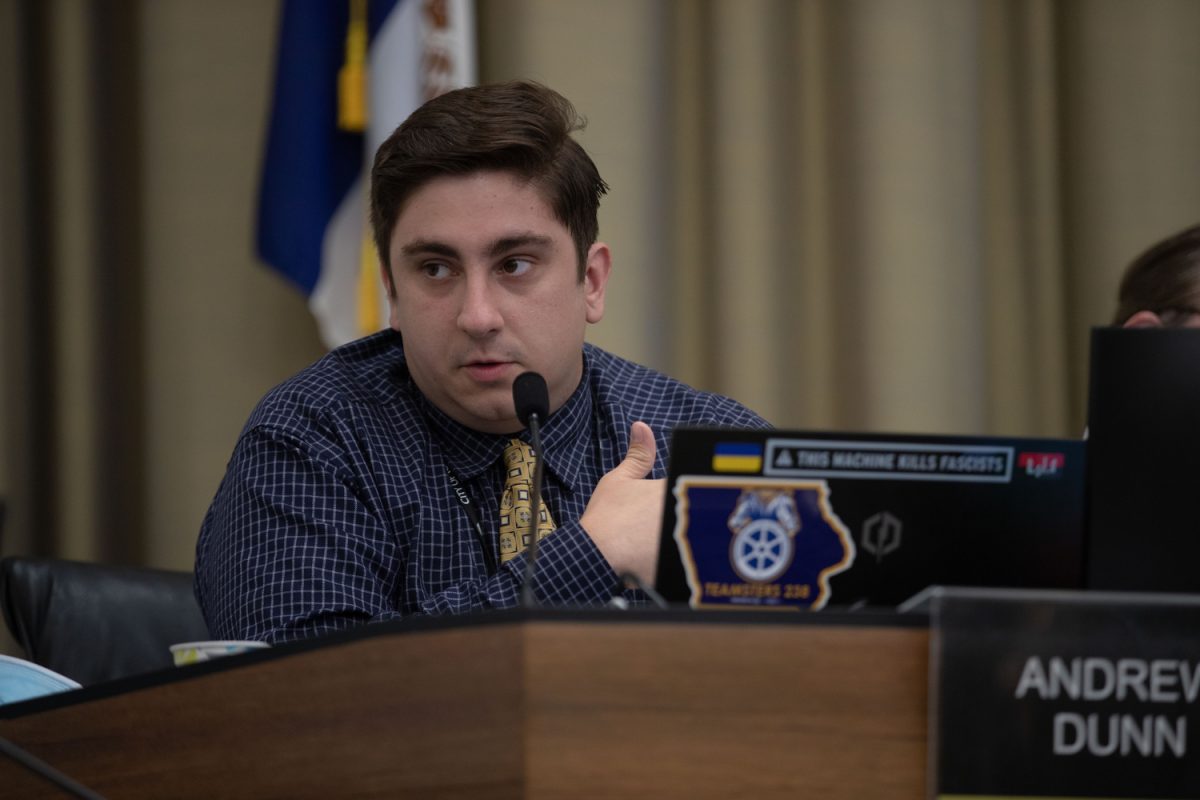Andrew Dunn, former at-large and future District C councilor, has expressed a strong interest in changing the way the election system for the Iowa City City Council works.
Dunn wrote in a Nov. 14 letter to the editor published in The Daily Iowan that he would like to change the “broken” election system to make it not only more intuitive for voters but also more equitable.
On the Iowa City City Council, there are three district seats — A, B, and C — and four at-large seats. Candidates running for a district seat must live within its boundaries, but a candidate running for an at-large seat can live anywhere within city limits.
In general elections, voters, no matter which district they reside in, can vote for all candidates on the ballot running for a district or at-large seat. However, for primary elections, only voters who live within the primary district can vote for the candidates in that election.
At-large councilor Laura Bergus, who is the future District A seat holder, said she was approached by many confused voters who were not aware of how the system worked during the District A primary this October.
Bergus said while she was campaigning for the primary, she often had to pull out a map to help voters figure out if they lived in District A and could vote in the primary. Also, some voters she encountered did not even know there was a primary election happening, she said.
In the District A primary election, less than 6.6 percent of the registered voters in the district voted in the race.
Iowa City is unique in the way its election system operates compared to other nearby city governments. The City of Cedar Rapids, for example, has a total of nine members on its council. Of those nine, three members plus the mayor are elected at-large, while the remaining five members are elected by the voters in their district.
The City of Coralville has a council of five members plus the mayor, who does not vote in council matters and is technically a separate entity from the council that acts as a supervisor of council duties and actions. The council’s five members are all elected at-large.
In his editorial, Dunn wrote that not only is this confusing for voters, who also said he was frequently asked how the election system worked, but it can also act as a systemic barrier to minority candidates getting elected to the council.
As cited in his editorial, an article by the NAACP Legal Defense and Educational Fund states that when communities of color do not make up the majority demographic of a jurisdiction, minority voters’ choices are often overruled by the votes of the majority group of white voters.
According to the U.S. Census Bureau’s website, Iowa City’s racial demographic makeup in 2022 was 73.8 percent white, 8.4 percent Black, and 6.4 percent Hispanic or Latino.
To help combat these issues, Dunn proposed three different potential changes that could be made to the city’s election system:
Keep the same number of at-large members on the council, and the district seats can only be voted upon by those who live in the same district.
Abolish the at-large seats and use only district seats that can then be voted on by their district’s respective voters.
No longer use the district seats and make all seats at-large.
In an interview with the DI, Dunn said the third option could be implemented immediately, but the first two would be implemented after two city council elections.
Doing this would help the current council make a more objective decision on which path they think would be best, rather than which path could help them win the next election as the average term for a councilor is normally two, he said.
The way these changes would be implemented would be through amending the city’s charter, which essentially acts as a constitution for the city to abide by and operate by.
The charter is reviewed every decade by a commission who are appointed by the city council. That commission makes recommendations to the council of potential changes that could be made to the charter. The council can then decide which changes they want to employ.
The next cycle of this process will begin in the next few months, and the commission will have a year to review the charter, City Attorney Eric Goers said.
Several times in the past, different charter review commissions have brought up the same issue Dunn has, but no actual change has been made regarding this topic, Goers said.
Goers said the city council could also amend the charter by passing a proposed amendment for voters to vote on, or by passing an ordinance that could be struck down by voters if enough petitioned against it.
A third way this change could come about does not involve the city council, as voters themselves could petition that a change be made, which would then go to a special election for voters to vote upon, Goers said.
Dunn, who will be sworn into his District C seat and back on the council in January, said his goal for this issue will be put before the council for a vote by February, and he plans to talk more with the community to get their input on the topic in the meantime.
He added that this topic is important to helping make Iowa City a better, more diverse place and also an issue he plans to pursue aggressively and involve the public every step of the way.
“Ultimately I think it’s going to come down to whether four councilors agree that we are the ones to make the change,” Dunn said. “And I hope that that is the case because 40 years has demonstrated that council has not been willing to do that, [and] the literature over the last 40 years has demonstrated that that has been a poor call.”



